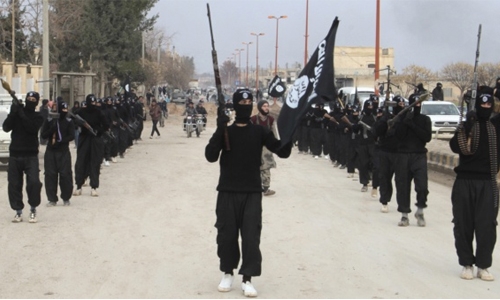Amid squabbles over Syria, will Daesh emerge on top?
I made every effort to write an optimistic and inspiring article looking forward to 2019. However, with a dozen drafts scrunched up in the waste paper bin, I’m sorry to acknowledge that the global prospects for 2019 look pretty frightening. Here I only have space to consider the catastrophes awaiting the Middle East. The Syrian war — which everyone regards as finished — is entering a new phase, with the imminent US departure contributing entirely new dimensions to the conflict for 2019. Trapped between the hammer of Recep Tayyip Erdogan and the anvil of Bashar Assad and Tehran, the Kurds have sought Damascus’ protection.
Thus, in recent days, pro-Assad forces hurriedly arrived at the gates of Manbij. This may keep the Turks out of this strategically vital town, but it is difficult to imagine Assad’s overstretched army adopting a similar posture further east, particularly with a gruesome battle for Idlib on the horizon. Donald Trump offered to let Erdogan’s troops directly replace US forces, which could be interpreted as inviting long-term Turkish military occupation of eastern Syria. Superficially, this grants Erdogan more than he ever dreamed of; allowing his forces to swarm across the border and neutralise Kurdish aspirations.
Yet, if Erdogan devours such vast territories, this decision will come back to haunt him, given the inevitable resistance from local Syrians. Iran is cock-a-hoop at the American withdrawal, yet the influx of Turkish forces would clash with Tehran’s aspirations to dominate eastern Syria. Turkish and Iranian expansionism would discountenance Moscow, which has its own interests to protect. Senior Russian officials have pledged to curb Iranian proxies but, across much of Syria, Russia lacks the ground strength to enforce this. Having invested billions in propping up Assad and perpetuating its own presence, Tehran won’t simply walk away because Vladimir Putin asks nicely.
There had previously been sufficient common ground in Russian-Turkish-Iranian interests to allow amicable collaboration in dictating this shattered nation’s future status. Is this all about to change? America’s withdrawal offers Benjamin Netanyahu renewed pretexts for annexing the remainder of the Golan Heights. Iran’s ascendancy in Syria makes an Israeli invasion almost a certainty, even though neither Hezbollah nor the Israelis desire conflict right now. Israeli elections in April are an additional wildcard. Among this perfect storm of crises, the Palestinian issue remains forgotten, despite the accelerating pace of settlement building and land confiscations.
With Trump setting the Turks, Iranians, Russians and Israelis on a collision course, Syrian and Arab influence has been marginalised further — particularly with half of the population displaced. Will there even be an entity recognisable as Syria after it disintegrates, Yugoslavia-like, into a patchwork of rival identities and zones of influence? During his Iraq trip last week, Trump warned that his Anbar-based forces could be deployed over the border “if we wanted to do something in Syria.” These threats — which ride roughshod over the principals of national sovereignty and international law — play into Iran’s hands by provoking renewed calls for US forces to pack their bags and leave.
US bases in western Iraq have failed to deter Iran’s paramilitary proxies from dominating the Syria-Iraq border zone. The resignations of two rare US officials who genuinely understand Iraq — Brett McGurk and James Mattis — leaves a dangerous policy vacuum at a delicate moment. Since May’s elections, Iraqi and Lebanese citizens have endured an institutional void as political factions grapple over Cabinet seats. Pro-Iran factions demand Iraq’s Interior Ministry, granting control over domestic security infrastructure. In Lebanon, Hezbollah demands not only a governing majority, but the right to appoint its acolytes to designated Sunni positions.
Prolonged stalemate risks undercapitalised banks not being bailed out and Lebanon’s economy plunging off a cliff edge. Tehran’s fingerprints are likewise visible in Yemen’s peace talks. Sweden has an excellent pedigree in mediating peace efforts; yet, even though the Houthis are facing strategic defeat, Tehran is apparently blocking their freedom to negotiate a dignified end to this devastating conflict.
Ayatollah Ali Khamenei insists on keeping the fires of conflict burning at Saudi Arabia’s rear entrance. This is a depressingly familiar Iranian tactic; compelling proxies to block political progress until Tehran can lever concessions for other regional priorities. With Iran wielding a depressingly strong hand on the regional chessboard, the ayatollahs won’t allow flexibility from minions in Sanaa, Beirut, Damascus or Baghdad.
One of my most pressing concerns for 2019 is for the ancient Christian communities, which act as a bellwether for regional security while contributing to a healthy and irreplaceable regional diversity. A century ago, around 14 percent of the Middle East was Christian. This may fall below 3 percent by 2025. It is perhaps too late for endangered Iraqi Christians, whose numbers plunged after 2003 and 2014. The Syrian war has been catastrophic for Christians, having faced persecution by extremists and stigmatisation when terrorised minorities sought regime protection. Interlocutors are often surprised when I describe thriving Palestinian Christian communities, but these are also under threat.
Lebanon was already a nation of emigrants, yet Hezbollaization and political paralysis are fuelling renewed, energy-sapping waves of migration, particularly from Christians who perceive no future for themselves. Daesh has done as much as anybody to purge the region’s Christians. Its resurgence thus threatens minority groups in particular. Despite what Trump says, Daesh is still active from territories in isolated parts of Syria and Iraq. Recent research suggests that Daesh may have hidden away hundreds of millions of dollars ready for its inevitable re-emergence.
The West shrugs its shoulders and abandons its regional commitments, while Iran, Russia and Turkey squabble over the scraps. Netanyahu, meanwhile, rolls up his sleeves and sharpens his knives, ready for a Sykes-Picot-style redrawing of regional borders. In the ensuing climate of anarchy and civil strife, we may have created the perfect conditions for 2019’s biggest net winner being a renascent Daesh.
Related Posts

